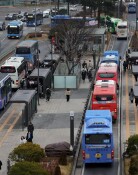[Opinion] North Korean Defectors in South
[Opinion] North Korean Defectors in South
Posted April. 29, 2003 22:11,
˝I had to face realities soon after I came to South Korea. What I learned about the society, economy and culture of this country at Hanawon, a government facility aimed to provide support for North Korean defectors, turned out to be a mirage. I don`t know how to start and what to do. I only found piles of dust at the rent apartment arranged by the government. I stood there blank-minded for some time. I felt all alone seeing the empty house. It seemed to me that I was the only one left alone in this world. The first day went by like that.˝
This is a part of an Internet journal posted by a man named Kim, a North Korean defector who came to South Korea in March 2001. But Kim did not give up. He grew familiar with prices of commodities and confident about his new life. One time he even gave directions for an old woman on the street. Kim, already in his late 30s, is now studying newspaper and media at a university. His story ended as he determined to study English hard in the coming season to get a good job.
Not all North Korean defectors learned to adjust themselves to realities successfully like Kim, however. Many of them are struggling to find their places in this society. Some attempt to commit suicide on the top of the mountain, where they can see far the northern sky. Some others become alcohol addicts or criminals. Dr. Yun Yeo-sang, an expert on North Korean defectors and senior researcher at the Korea Politics Development Institute, cite some behavioral patterns, extremism, unreasonably high expectations, mental instability and sense of insecurity as common problems with North Korean defectors. The government support system, which sends them to the outside world after only a two month-long education, is hardly helpful. Although there are civic and religious organizations helping them, their roles are limited.
According to statistics released by the Ministry of Reunification, there were 2,886 North Korean defectors in South Korea as of the end of 2002. Last year alone, some 1,100 entered the country, breaking the 1,000-a-year mark. The society in general, however, seems to pay little attention to the lives of the North Koreans, seen as a smaller version of individual-level reunification. The New York Times recently published an investigative report about lives of young North Korean defectors in the South. It seems that foreign countries are more interested in human rights issues of North Koreans after the adoption of U.N. resolution. The report said that when asked how it was like living in the South, young North Koreans replied, “We feel like aliens living in a foreign planet.” It is our responsibility, then, to embrace them and raise them as full members of the society.
Song Moon-hong, Editorial Writer, songmh@donga.com







